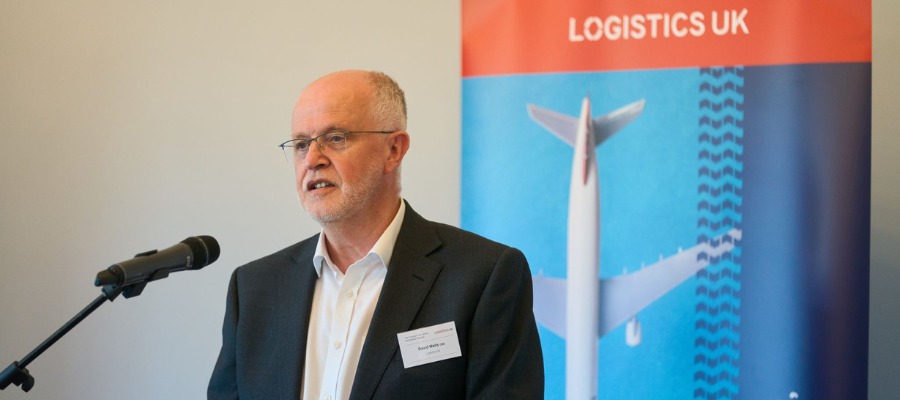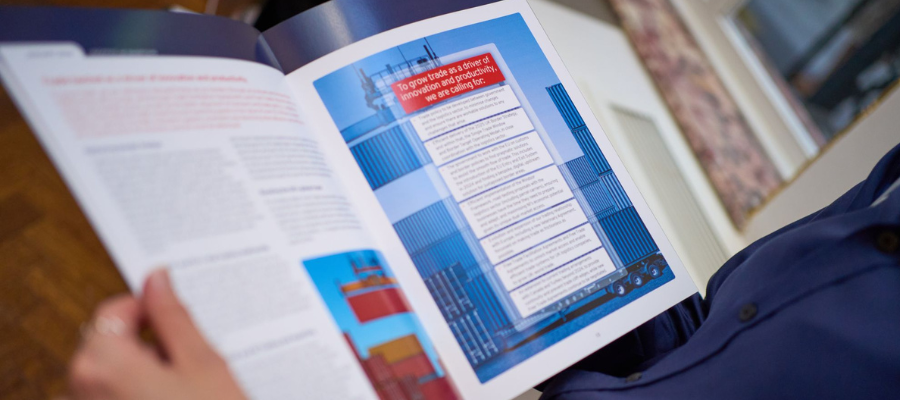🕒 Article read time: 2 minutes
Logistics UK hosts inaugural Sir James Whitehead address

Logistics UK hosted the inaugural Sir James Whitehead Address on 19 June, bringing together an audience of logistics leaders, policy makers and thought leaders to discuss the sector’s political and economic landscape.
Logistics UK hosted the inaugural Sir James Whitehead Address on 19 June, bringing together an audience of logistics leaders, policy makers and thought leaders to discuss the sector’s political and economic landscape.
 Logistics UK's CEO, David Wells, opened the event by explaining its purpose is to support the logistics sector to understand and engage with the big issues that are shaping our world and politics.
Logistics UK's CEO, David Wells, opened the event by explaining its purpose is to support the logistics sector to understand and engage with the big issues that are shaping our world and politics.
The address entitled ‘Trade, economics and a crisis of politics’ was delivered by Anand Menon, Professor of European and Foreign Affairs at King’s College London and Director of UK in a Changing Europe.
 He set out how major economic and political shifts have impacted our trade, the long-term impact of Brexit on our politics, the UK’s challenging economic performance and the hard choices that will face whoever wins the election.
He set out how major economic and political shifts have impacted our trade, the long-term impact of Brexit on our politics, the UK’s challenging economic performance and the hard choices that will face whoever wins the election.
Professor Menon’s address was followed by discussion chaired by Logistics UK Chief Executive David Wells OBE with John McTernan, former Political Secretary to the Prime Minister Tony Blair, James Wroath, CEO of Wincanton and Michelle Gardner, Logistics UK Deputy Director – Policy.
 The wide-ranging conversation covered what we could expect from Labour if it wins the election, what it will take to get growth going in a constrained fiscal environment, the vital role the logistics sector plays underpinning the economy, its need for planning reform and grid infrastructure to kickstart green growth, and the opportunity for automation to drive UK productivity.
The wide-ranging conversation covered what we could expect from Labour if it wins the election, what it will take to get growth going in a constrained fiscal environment, the vital role the logistics sector plays underpinning the economy, its need for planning reform and grid infrastructure to kickstart green growth, and the opportunity for automation to drive UK productivity.
Wells said: “We hosted the Sir James Whitehead Address, named after our founder and a leading 19th century merchant, to do three things: highlight that logistics is a major economic sector that has a long and important history; emphasise that logistics is integral to and underpins our modern economy; and most importantly, look around us and to the future, to understand and engage with the big issues that are shaping our world and politics.
"Only by doing this, can our sector help the UK capitalise on the opportunities and mitigate the risks facing us.
“Too often, logistics is not thought of in these terms. We are recognised as essential but that is different from being regarded as a driver for the future – as an important player in the key questions of our time. That is what we want to change, and the Sir James Whitehead Address is a key part of that effort.”
Published On: 27/06/2024 15:30:00

Comments Section
If you are a Logistics UK member login to add comments.
News In Brief
Financial incentives needed for businesses to pick zero emission vans
Businesses that rely on vans to distribute goods are still holding off on switching to electric due to the cost of new vehicles and insufficient charging facilities.
Research from clean energy and advocacy group, Transport and Environment, found there are a million more vans on the road since 2014. Most of these vans are run on diesel and carbon emissions from UK vans has risen by 63% since 1990.
Ralph Palmer of Transport and Environment said: “There’s not enough progress being made to support businesses and sole traders to make the switch.”
Oliver Lord, UK head of the Clean Cities campaign, said the UK was lagging behind European neighbours such as the Netherlands, which is working to create zero emission logistics zones.
Lord said: “It means that when you’re driving a van into their cities, if it’s registered after next year, it has to be electric. And by 2030, they’ve all got to be electric. The share of electric vans sold in the Netherlands is twice that in the UK.
“There’s no way we’ll clean our air and hit our climate goals unless we do more to help businesses switch away from polluting diesel vans.”
Last September, the government set out the zero emission vehicles (ZEV) mandate, which means that by the end of this year, 10% of all new van and car sales should be electric, rising to 100% by 2035.
Senior Policy Manager, Logistics UK, Denise Beedell said: “Our research clearly shows that members are fully aware of their obligations to decarbonise their van operations over the coming years, but support is urgently needed to address the many challenges, including improved charging infrastructure, regulatory weight threshold reform, fiscal support to acquire ZE vehicles and training support to upskill vehicle technicians for new zero emission vehicle technologies.”
The Society of Motor Manufacturers and Traders said 341,455 new vans were registered last year, of which 20,253 were powered by electric batteries.
Latest articles
Generation Logistics Case Study
Niall Delargy, Senior Marketing Executive – Motia.
Read time: 2 minutes
View article
Member notice: Do you need to apply for an IVA for your vans and light goods vehicles?
Apply for Individual Vehicle Approval (IVA) if you're making or importing a very small number of vans or light goods vehicles (also known as IVA 1LG).
Read time: 2 minutes
View article
Thames’ biggest port launches new commercial vehicle charging hub
Fleete has unveiled its first major project in the UK with the development of a dedicated commercial vehicle rapid electric charging hub, believed to be the largest in the country.
Read time: 3 minutes
View article